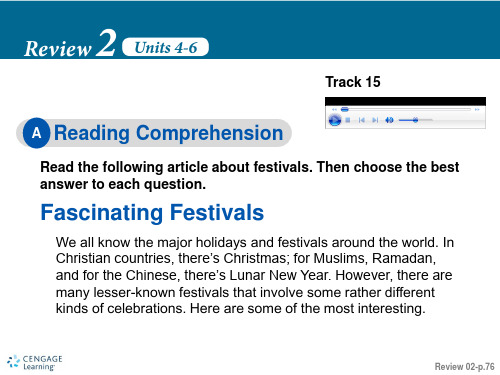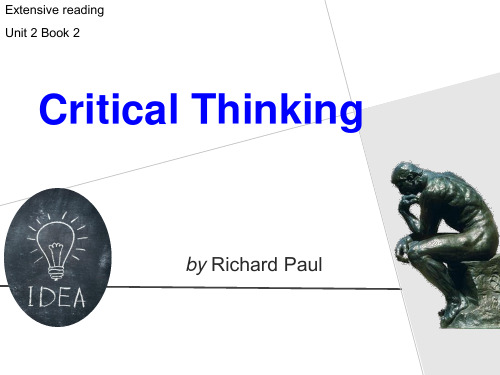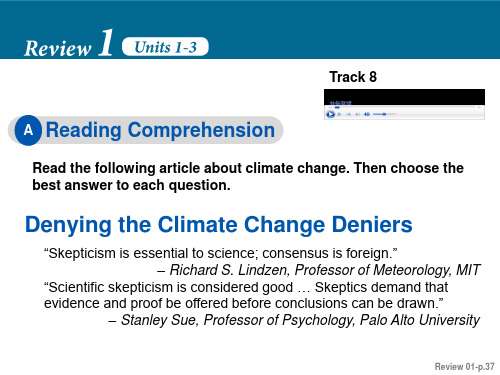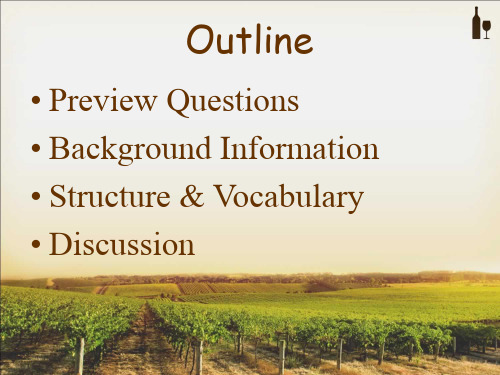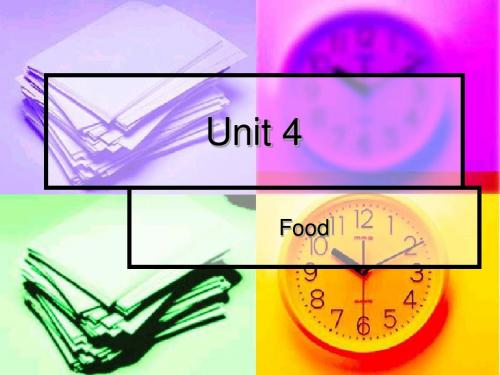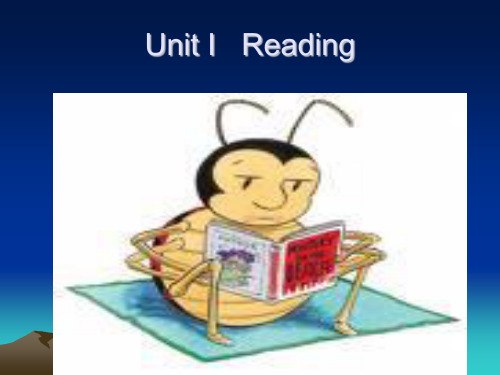大学英语泛读教程2PPT教学课件-Review 01
- 格式:pptx
- 大小:175.99 KB
- 文档页数:9
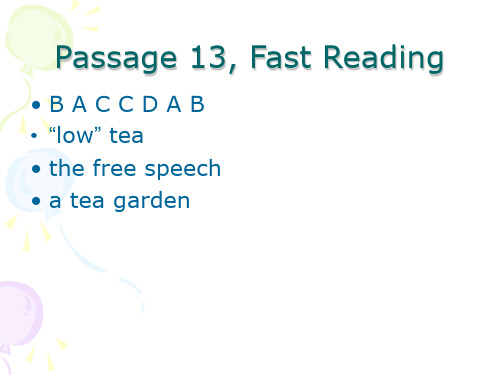
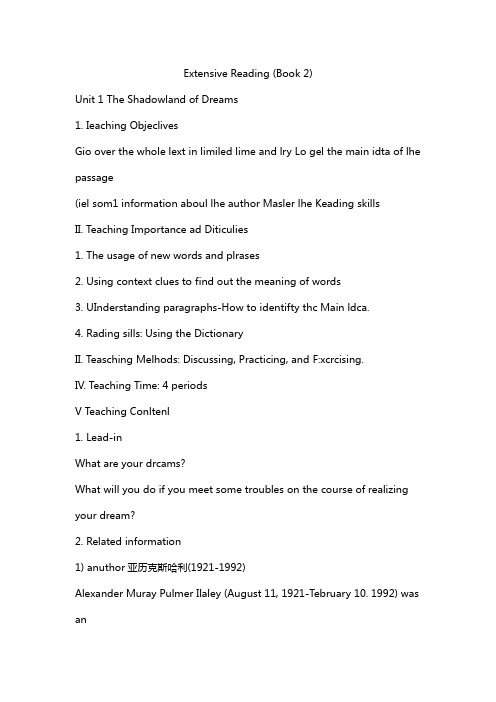
Extensive Reading (Book 2)Unit 1 The Shadowland of Dreams1. Ieaching ObjeclivesGio over the whole lext in limiled lime and lry Lo gel the main idta of lhe passage(iel som1 information aboul lhe author Masler lhe Keading skillsII. Teaching Importance ad Diticulies1. The usage of new words and plrases2. Using context clues to find out the meaning of words3. UInderstanding paragraphs-How to identifty thc Main ldca.4. Rading sills: Using the DictionaryII. Teasching Melhods: Discussing, Practicing, and F:xcrcising.IV. Teaching Time: 4 periodsV Teaching Conltenl1. Lead-inWhat are your drcams?What will you do if you meet some troubles on the course of realizing your dream?2. Related information1) anuthor亚历克斯哈利(1921-1992)Alexander Muray Pulmer Ilaley (August 11, 1921-Tebruary 10. 1992) was anAmerican wriler. Ile is best known as the author of Rools.非洲商的美国作家。
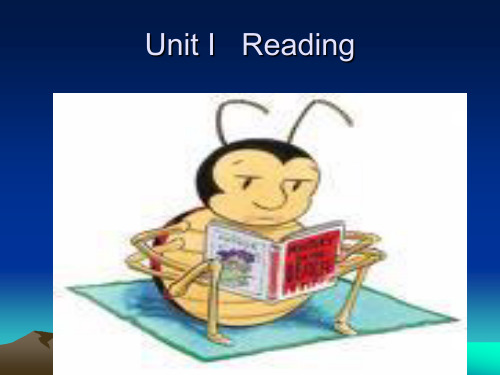
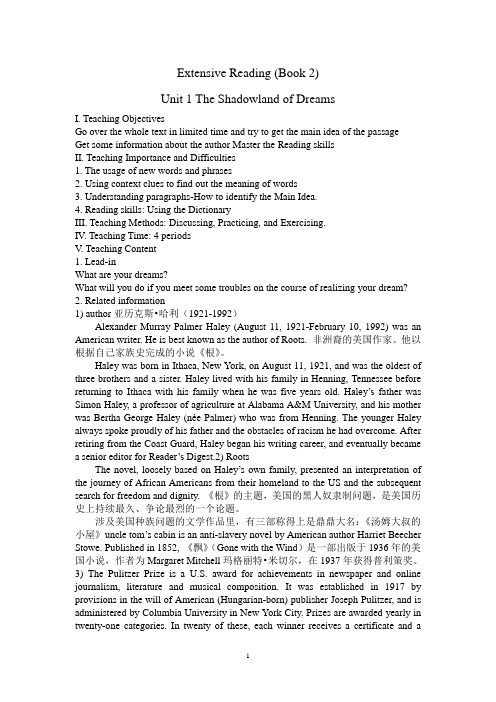
Extensive Reading (Book 2)Unit 1 The Shadowland of DreamsI. Teaching ObjectivesGo over the whole text in limited time and try to get the main idea of the passageGet some information about the author Master the Reading skillsII. Teaching Importance and Difficulties1. The usage of new words and phrases2. Using context clues to find out the meaning of words3. Understanding paragraphs-How to identify the Main Idea.4. Reading skills: Using the DictionaryIII. Teaching Methods: Discussing, Practicing, and Exercising.IV. Teaching Time: 4 periodsV. Teaching Content1. Lead-inWhat are your dreams?What will you do if you meet some troubles on the course of realizing your dream? 2. Related information1) author亚历克斯•哈利(1921-1992)Alexander Murray Palmer Haley (August 11, 1921-February 10, 1992) was an American writer. He is best known as the author of Roots. 非洲裔的美国作家。
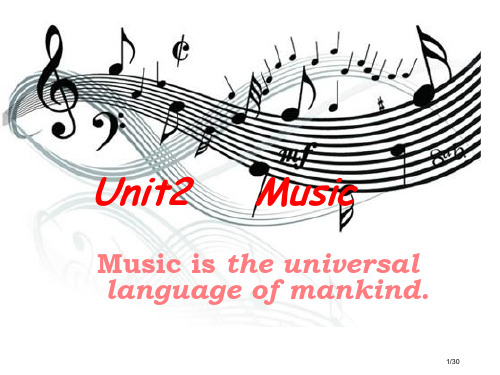
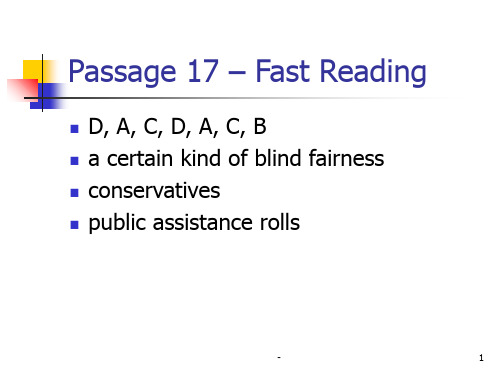
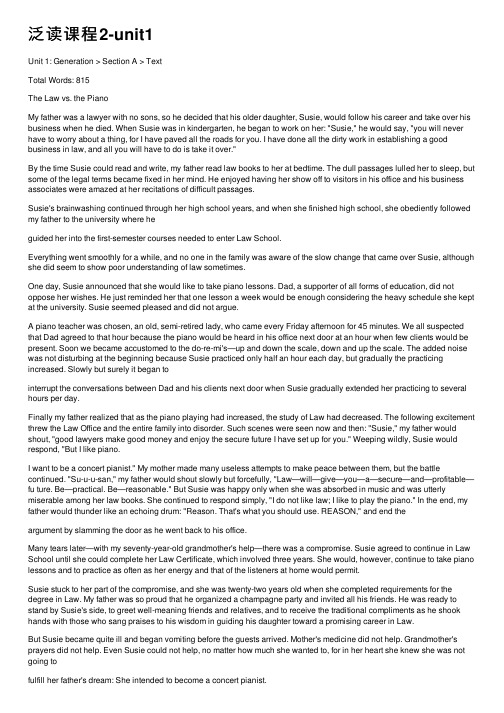
泛读课程2-unit1Unit 1: Generation > Section A > TextTotal Words: 815The Law vs. the PianoMy father was a lawyer with no sons, so he decided that his older daughter, Susie, would follow his career and take over his business when he died. When Susie was in kindergarten, he began to work on her: "Susie," he would say, "you will never have to worry about a thing, for I have paved all the roads for you. I have done all the dirty work in establishing a good business in law, and all you will have to do is take it over."By the time Susie could read and write, my father read law books to her at bedtime. The dull passages lulled her to sleep, but some of the legal terms became fixed in her mind. He enjoyed having her show off to visitors in his office and his business associates were amazed at her recitations of difficult passages.Susie's brainwashing continued through her high school years, and when she finished high school, she obediently followed my father to the university where heguided her into the first-semester courses needed to enter Law School.Everything went smoothly for a while, and no one in the family was aware of the slow change that came over Susie, although she did seem to show poor understanding of law sometimes.One day, Susie announced that she would like to take piano lessons. Dad, a supporter of all forms of education, did not oppose her wishes. He just reminded her that one lesson a week would be enough considering the heavy schedule she kept at the university. Susie seemed pleased and did not argue.A piano teacher was chosen, an old, semi-retired lady, who came every Friday afternoon for 45 minutes. We all suspected that Dad agreed to that hour because the piano would be heard in his office next door at an hour when few clients would be present. Soon we became accustomed to the do-re-mi's—up and down the scale, down and up the scale. The added noise was not disturbing at the beginning because Susie practiced only half an hour each day, but gradually the practicing increased. Slowly but surely it began tointerrupt the conversations between Dad and his clients next door when Susie gradually extended her practicing to several hours per day.Finally my father realized that as the piano playing had increased, the study of Law had decreased. The following excitement threw the Law Office and the entire family into disorder. Such scenes were seen now and then: "Susie," my father would shout, "good lawyers make good money and enjoy the secure future I have set up for you." Weeping wildly, Susie would respond, "But I like piano.I want to be a concert pianist." My mother made many useless attempts to make peace between them, but the battle continued. "Su-u-u-san," my father would shout slowly but forcefully, "Law—will—give—you—a—secure—and—profitable—fu ture. Be—practical. Be—reasonable." But Susie was happy only when she was absorbed in music and was utterly miserable among her law books. She continued to respond simply, "I do not like law; I like to play the piano." In the end, my father would thunder like an echoing drum: "Reason. That's what you should use. REASON," and end theargument by slamming the door as he went back to his office.Many tears later—with my seventy-year-old grandmother's help—there was a compromise. Susie agreed to continue in Law School until she could complete her Law Certificate, which involved three years. She would, however, continue to take piano lessons and to practice as often as her energy and that of the listeners at home would permit.Susie stuck to her part of the compromise, and she was twenty-two years old when she completed requirements for the degree in Law. My father was so proud that he organized a champagne party and invited all his friends. He was ready to stand by Susie's side, to greet well-meaning friends and relatives, and to receive the traditional compliments as he shook hands with those who sang praises to his wisdom in guiding his daughter toward a promising career in Law.But Susie became quite ill and began vomiting before the guests arrived. Mother's medicine did not help. Grandmother's prayers did not help. Even Susie could not help, no matter how much she wanted to, for in her heart she knew she was not going tofulfill her father's dream: She intended to become a concert pianist.And she did just that. Years later, after Susie became a concert pianist of some fame and a visiting lecturer at one of the best universities on the East Coast, Father was almost as proud of her as he would have been to see her a lawyer. But he never did admit that Susie is a reasonable woman.(注:可编辑下载,若有不当之处,请指正,谢谢!)。

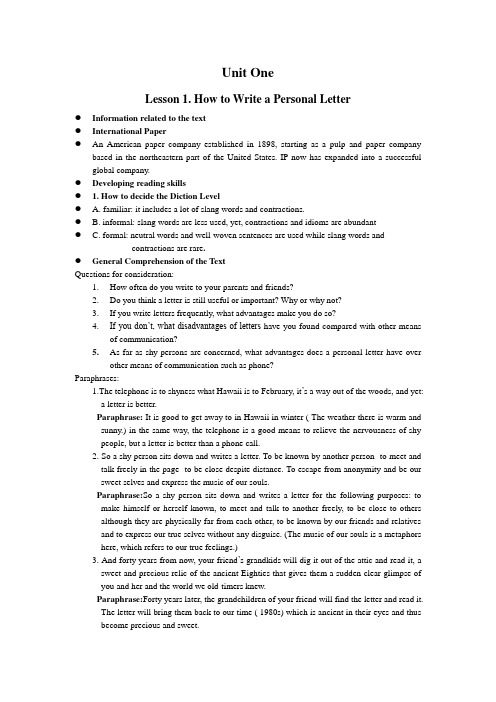
Unit OneLesson 1. How to Write a Personal Letter●Information related to the text●International Paper●An American paper company established in 1898, starting as a pulp and paper companybased in the northeastern part of the United States. IP now has expanded into a successful global company.●Developing reading skills● 1. How to decide the Diction Level● A. familiar: it includes a lot of slang words and contractions.● B. informal: slang words are less used, yet, contractions and idioms are abundant● C. formal: neutral words and well-woven sentences are used while slang words andcontractions are rare.●General Comprehension of the TextQuestions for consideration:1.How often do you write to your parents and friends?2.Do you think a letter is still useful or important? Why or why not?3.If you write letters frequently, what advantages make you do so?4.If you don’t, what disadvantages of letters have you found compared with other meansof communication?5.As far as shy persons are concerned, what advantages does a personal letter have overother means of communication such as phone?Paraphrases:1.The telephone is to shyness what Hawaii is to February, it’s a way out of the woods, and yet:a letter is better.Paraphrase: It is good to get away to in Hawaii in winter ( The weather there is warm and sunny.) in the same way, the telephone is a good means to relieve the nervousness of shy people, but a letter is better than a phone call.2. So a shy person sits down and writes a letter. To be known by another person- to meet andtalk freely in the page- to be close despite distance. To escape from anonymity and be our sweet selves and express the music of our souls.Paraphrase:So a shy person sits down and writes a letter for the following purposes: to make himself or herself known, to meet and talk to another freely, to be close to others although they are physically far from each other, to be known by our friends and relatives and to express our true selves without any disguise. (The music of our souls is a metaphors here, which refers to our true feelings.)3. And forty years from now, your friend’s grandkids will dig it out of the attic and read it, asweet and precious relic of the ancient Eighties that gives them a sudden clear glimpse of you and her and the world we old-timers knew.Paraphrase:Forty years later, the grandchildren of your friend will find the letter and read it.The letter will bring them back to our time ( 1980s) which is ancient in their eyes and thus become precious and sweet.●Important StructureA is to/forB what X is/stand to YA is what X is to Y to Bwhat clause 是―A is‖的补语The man who cannot be trusted is to society what a bit of rotten timber is to a house.不可信赖的人对于社会,正如朽木对于家屋一样.What the blueprint is to the builder the outline is to the writer.作家对于写作的轮廓,就像建筑师对于蓝图一样Reading Skills (check up mainly)English-Chinese Translation or Questions for Consideration (check up mainly) Page 71.电话对于羞涩的人来说,就像是夏威夷对二月天一样,可以避免麻烦,然而,写信更好。
